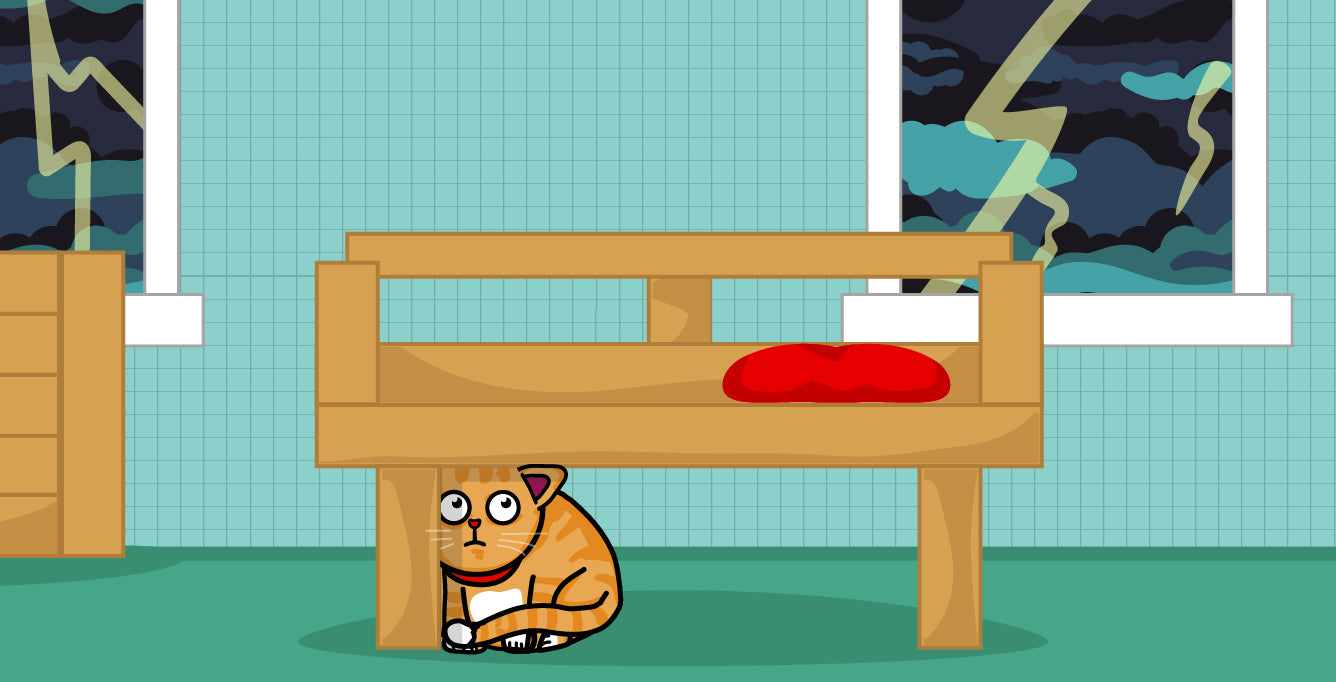Rain and thunderstorms can cause severe stress in kittens that have phobias for them, or who are experiencing them for the first time. This phobia, if not addressed correctly, could become a lifelong problem. But, luckily, there are steps that you can take to keep your kitty safe and relaxed.

Symptoms of stress during storms
You may notice some symptoms in your kitten before or during storms and they are signs that your kitten is stressed. These symptoms include:
- Pacing around the room or house
- Panting, drooling or meowing (it’s usually a very specific, distressed-sounding meow)
- Trembling, which can worsen as the storm grows in intensity
- Hiding under furniture, in corners, etc.
- Refusing to leave your side
- Incontinence
- Self-inflicted trauma (usually caused when they are trying to escape a room, crawl into a small space, etc.)
Possible causes of the phobia
The cause of the phobia may well be as simple as your kitten not being exposed to either a lot of storms or indeed any storm before in its life. Therefore, they won’t know how to act. Owners may also, unintentionally, contribute to the phobia if they have a phobia for, for example, thunderstorms or loud noises.
Another cause to consider is genetics, as your kitten may be predisposed to what can be referred to as “emotional reactivity”.

Diagnosis of the phobia
If you find that your kitten’s reaction to rain, thunderstorms, or even other sounds (for example fireworks) are severe, you can go to your vet for assistance. Depending on the age of your kitten, there may be something which you can give them during severe thunderstorms to calm them down.
However, your vet will also need to make sure that there is nothing else wrong with your kitten health-wise and that it definitely is a thunderstorm or noise phobia. The reason for this is that there are some illnesses which also carry the same symptoms as those listed above.
It is therefore very important to take your kitten to the vet if you see that the storm is long over but they are still in a state of panic, as this may mean that there is something else wrong besides them being stressed.
Treatment for the phobia
Treatment for your kitten’s phobia need not be medication; they can also be treated with behaviour modification.
Behaviour modification includes such elements as not punishing your kitten when they are scared or stressed by a storm, but also not comforting them. Desensitisation is often used, with audio recordings of rainstorms or thunderstorms being used.
Behaviour modification must only be done with the help of experts, though. Improper use can make things worse!
Though not exactly treatment, per se, getting your kitten microchipped is a must. If you’re not sure if your kitten was microchipped at the breeder or shelter where you adopted them from, ask your vet to check. The microchip won’t hurt your kitten or impair their movement (it really is that small) and is also not very expensive. Just remember to keep all your details on the microchip up to date at all times.

What you can do to lessen your kitten’s fear
- Keep your kitten inside during the storm. If they have a phobia for rain, even leaving them in their enclosure’s “house” could be frightening for them even though it’s just a light rainstorm. If there is thunder, the noise will also be louder outside than in the house, making it more frightening for your kitten. Rather leave playtime outside until after the rain!
- If you don’t have a cat enclosure for your kitten in the garden, then staying outside is a definite no-no. Not only are the chances good that they will get soaked, they may just wander away from the house to look for somewhere dry and won’t be able to find their way back.
- Once you know your kitten is inside, close off all the exits in the home, including windows (yes, even those ones where you think they won’t be able to reach) and cat flaps. Be sure not to leave any windows partly open, as your kitten may try to get out through there and hurt themselves doing so. Remove any knick-knacks that can fall and break (and cut little paws) in case your kitten goes on a whole-house-run.
- Also close the blinds and curtains to dim any lightning strikes.
- Give them a safe spot to hide if they want to. If you see that your kitten is hiding or always hides in a specific room, make that a safe spot with a favourite blanket or bed, toys, etc. to make them feel safer. If possible, stay with them in the same room when they are still very small. However, it is imperative that you act calm at all times and don’t give away that thunderstorms is something to be afraid of — even if it’s a bad storm.
- To help your kitten see that there’s nothing to worry about, put on some music or a film. Podcasts or the radio will also work, of course. Sometimes you’ll notice that kittens will relax when there are other sounds present that they are familiar with. Try to, therefore, choose music or films that you’ve listened to or watched before.
- When all else fails, try playing with your kitten to get their attention away from the storm. Whether it’s a laser-pointer or a ball fastened to a string, getting them to pounce and stalk their prey may just be what they need.
Photo by Pexels.








